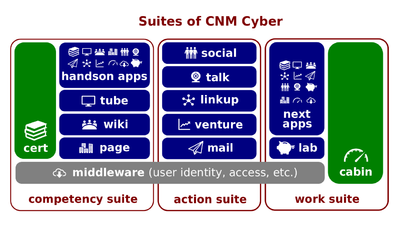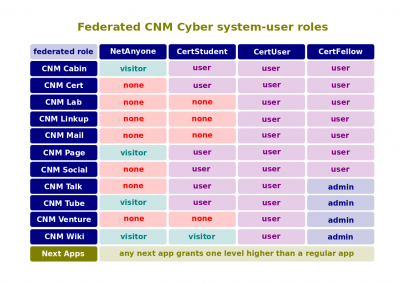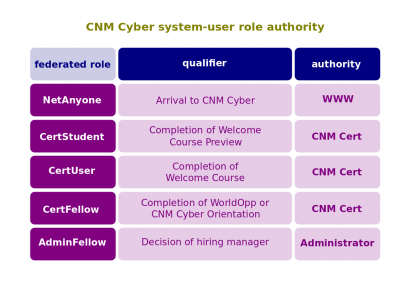Difference between revisions of "System-User Roles"
(→Script) |
(→Script) |
||
| Line 15: | Line 15: | ||
:[[WorldOpp Middleware]] controls your access to various resources such as applications, networks, and services. You have started here, at [[CNM Cyber]], as a newbie with minimal rights. The more you learn here, the more system access permissions the ''Middleware'' grants. | :[[WorldOpp Middleware]] controls your access to various resources such as applications, networks, and services. You have started here, at [[CNM Cyber]], as a newbie with minimal rights. The more you learn here, the more system access permissions the ''Middleware'' grants. | ||
| − | :To accomplish that task, the ''Middleware'' assigns every user with his or her [[system-user role]]. For instance, any user of the [[World Wide Web]] has [[NetAnyone]]'s rights at [[CNM Cloud]]. He or she can view pages of [[CNM Page]], [[CNM Tube]], and [[CNM Wiki]], but cannot edit anything. [[CertStudent]]s are enrolled into this very welcome course, as well as can post comments on [[CNM Page]] and [[CNM Tube]]. [[CertUser | + | :To accomplish that task, the ''Middleware'' assigns every user with his or her [[system-user role]]. For instance, any user of the [[World Wide Web]] has [[NetAnyone]]'s rights at [[CNM Cloud]]. He or she can view pages of [[CNM Page]], [[CNM Tube]], and [[CNM Wiki]], but cannot edit anything. [[CertStudent]]s are enrolled into this very welcome course, as well as can post comments on [[CNM Page]] and [[CNM Tube]]. [[CertUser]] can join communities at [[CNM Social]], and so on. To get the [[CertUser]] ''role'', one has to successfully pass [[CNM Cyber Orientation]]. |
:Some permissions such as appointing other administrators and alternating the algorithms must be done manually. The bulk of user permissions at [[CNM Cloud]] are granted automatically. In [[cyber-security]], user management operations are called [[identity and access management]] ([[identity and access management|IAM]]). | :Some permissions such as appointing other administrators and alternating the algorithms must be done manually. The bulk of user permissions at [[CNM Cloud]] are granted automatically. In [[cyber-security]], user management operations are called [[identity and access management]] ([[identity and access management|IAM]]). | ||
Revision as of 19:12, 24 September 2020
System-User Roles (hereinafter, the Lectio) is the lesson part of the Middleware Essentials lesson that introduces its participants to CNM Cabin. This lesson belongs to the CNM Cyber for Experience session of the CNM Cyber Orientation.
Content
The predecessor lectio is User Identities at Cloud.
Key terms
- System-user role. The set of capacities often called permissions that a system grants to any user who belongs to a particular role.
- NetAnyone. The system-user role for an end-user of the World Wide Web whom CNM Cyber hasn't identified yet.
- CertStudent. The system-user role that CNM Cyber grants upon completion of the CNM Cyber Welcome Session.
- CertUser. The system-user role that CNM Cyber grants to any graduate from the CNM Cyber Orientation.
- CertFellow. The system-user role that CNM Cyber grants to any graduate from CNM Cyber Placement.
Script
- WorldOpp Middleware controls your access to various resources such as applications, networks, and services. You have started here, at CNM Cyber, as a newbie with minimal rights. The more you learn here, the more system access permissions the Middleware grants.
- To accomplish that task, the Middleware assigns every user with his or her system-user role. For instance, any user of the World Wide Web has NetAnyone's rights at CNM Cloud. He or she can view pages of CNM Page, CNM Tube, and CNM Wiki, but cannot edit anything. CertStudents are enrolled into this very welcome course, as well as can post comments on CNM Page and CNM Tube. CertUser can join communities at CNM Social, and so on. To get the CertUser role, one has to successfully pass CNM Cyber Orientation.
- Some permissions such as appointing other administrators and alternating the algorithms must be done manually. The bulk of user permissions at CNM Cloud are granted automatically. In cyber-security, user management operations are called identity and access management (IAM).
Federated vs System Roles is the successor lectio.
Questions
Lectio quiz
- The answer is recorded for the lectio completion purpose:
- Would you be interested in working on identity and access management (IAM) at CNM Cyber? --Yes/No/I'm not sure/Let me think/Let's move on


